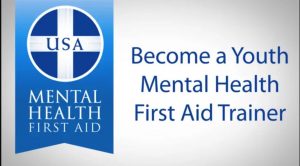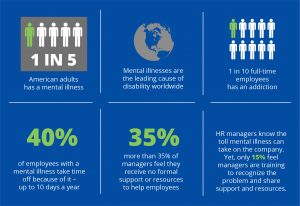Mental health first aid collaborative making progress five years in
By Dave Fidlin For Chronicle Media — February 5, 2020 When the building blocks were first assembled more than a half-decade ago, organizers came up with a simple mission — a mission they say they are forging ahead to try and achieve so residents across McLean County have a greater understanding of the complex issues surrounding mental health.
When the building blocks were first assembled more than a half-decade ago, organizers came up with a simple mission — a mission they say they are forging ahead to try and achieve so residents across McLean County have a greater understanding of the complex issues surrounding mental health.
The Mental Health First Aid Collaborative, which is entering its sixth year, began as an outgrowth of a big-picture health needs assessment within McLean County that occurred in 2012.
“Back then, mental health was one of the major things we chose to work on,” said Maureen Sollars of the McLean County Health Department, which coordinates the First Aid training. “One of our goals is to have one person on every block in McLean County go through this training.”
The local health department is one of multiple agencies and organizations that have banded together and offered the training programs in recent years. Sollars said 10 to 12 sessions are offered per year; some of the classes touch on strategies for youth aged 12-18, while others focus on adults.
Sharon Mills is an Illinois State University staff member who oversees the Central Illinois Area Health Education Center, another agency partnering with the collaborative. Mills said the local training sessions stem from a program that was first developed on the other side of the globe.
Mental Health First Aid, which was created in Australia, has been described as an evidence-based training course that is designed to give members of the public the fundamental skills needed to assist someone who is developing a mental health problem or experiencing a mental health crisis.
“These courses raise awareness of the signs and symptoms someone may be in crisis or developing a mental illness, provide a plan to respond when appropriate and share health care resources and information,” Mills said. “This helps reduce stigma related to mental illness and encourages hope for recovery.”
Sollars said the intent is to keep the costs for the eight-hour training sessions as low as possible. The cost typically hovers around $10 and includes such incidentals as course materials, though some fees have been waived in the past if grant funding is available.

Mental Health First Aid teaches people how to identify, understand and respond to signs of mental illnesses and substance use disorders. More than 2 million people across the United States have been trained in Mental Health First Aid by a dedicated base of more than 15,000 Instructors. (Source: mentalhealthfirstaid.org)
“We’ve been able to offer 40 courses (since the Mental Health First Aid Collaborative was established), and over 2,000 people have attended one of the training sessions here in McLean County,” Sollars said.
The MHFA Collaborative has taught 110 courses since 2014 and over 40 in the last two years.
Since its inception, Sollars and Mills said partnerships with area organizations and agencies have been a fundamental backbone to the continuation of the training programs. Some of the other partners include Chestnut Global Partners, Illinois Prairie Community Foundation, McLean County Center for Human Services and the two local hospitals.
As 2020 picks up steam, Mills said her office, through ISU, is in the process of recruiting an AmeriCorps member to teach Mental Health First Aid. This will be the third consecutive year of this particular partnership.
While Sollars and Mills said they are pleased with the progress that has taken place since the collaborative was established in McLean County, both adamantly say much more work is needed to ensure people in need of mental health services receive it.
At the same time, Sollars and Mills said they hope some of the past stigmas associated with the condition can be wiped away.
“There is help available,” Mills said. “Recovery is possible. It may look different for different people. But people can live productive lives.”
From the comments she has received since the collaborative was established, Sollars said the training courses “reduce that stigma throughout the community.” She added, “I think it is just so important for people to know about (mental health) so they’re not afraid of it.”



